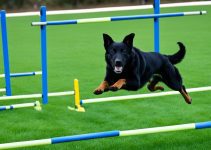As a dog lover, I’ve always been fascinated by the unique traits and characteristics of different dog breeds. One breed that never fails to capture my attention is the English Bulldog. With its muscular build and wrinkled face, the English Bulldog is a distinct and lovable breed.
According to the American Kennel Club, Bulldogs were the fifth most popular dog breed in the United States in 2019. Their calm and well-mannered temperament make them ideal family pets, and many owners consider them to be their loyal companions.
However, like any dog breed, English Bulldogs can encounter behavior problems that require attention and understanding. In this article, I will shed light on some common issues with English Bulldogs and offer insights into how to address them effectively.
Whether you already own an English Bulldog or are considering bringing one into your home, it’s essential to be aware of these behavior problems to provide them with the best care and support.
Aggressive Behavior in English Bulldogs
English Bulldogs, like any other breed, may display aggressive behavior if not properly socialized. It’s essential for owners to understand the potential reasons behind their Bulldogs’ aggression in order to address it effectively.
Aggression in Bulldogs can be triggered by factors such as fear, protection of territory, or a lack of adequate training and socialization. When Bulldogs feel threatened or insecure, they may resort to aggressive behaviors like growling, snapping, or even biting.
To curb aggressive behavior in English Bulldogs, it is crucial to start early and seek professional guidance if necessary. Training methods that employ positive reinforcement techniques and gradual exposure to new situations can greatly aid in mitigating aggression.

Through positive reinforcement, owners can reward their Bulldogs for exhibiting calm and non-aggressive behavior. By gradually exposing Bulldogs to different environments, people, and animals, they can learn to feel more comfortable and less threatened.
While it’s imperative to address aggressive behavior promptly, it is equally important to approach the training process with patience and consistency. Seeking the assistance of a professional trainer or behaviorist can provide valuable guidance tailored specifically to your Bulldog’s needs.
Excessive Barking in English Bulldogs
English Bulldogs are generally known for their laid-back and quiet demeanor, but there are instances when they may develop a barking problem. Excessive barking can be a common behavior issue in Bulldogs, and it is essential for owners to understand the underlying causes.
Bulldogs may bark excessively when they are bored or anxious. This can manifest as continuous barking, even at the slightest provocation. Excessive barking in Bulldogs can also be a sign of separation anxiety or a lack of mental stimulation.
To address excessive barking, it is crucial to address the root cause. Providing regular exercise tailored to their physical needs and mental enrichment activities can help keep Bulldogs engaged and mentally stimulated, thus reducing their urge to bark excessively. Positive reinforcement training can also be beneficial in teaching Bulldogs alternative behaviors and rewarding them for quiet behavior.
Remember, it’s important to approach the issue with patience and consistency. Punishing or scolding Bulldogs for barking may cause further anxiety or confusion. Instead, focus on redirecting their attention and reinforcing calm behavior.
Separation Anxiety in English Bulldogs
English Bulldogs are known to be loving and loyal companions, but they are also prone to separation anxiety. Separation anxiety is a condition where dogs become extremely distressed when left alone. It can manifest in destructive behavior, excessive barking, or even house soiling.
It is important for Bulldog owners to understand the signs of separation anxiety and how to help their furry friends cope with it. Gradual desensitization and counterconditioning techniques can be utilized to alleviate separation anxiety in English Bulldogs.
One effective approach is to gradually accustom Bulldogs to being alone by leaving them for short periods of time and gradually increasing the duration. This helps them build confidence and reduce their anxiety. Providing interactive toys and comforting items, such as a favorite blanket or a piece of clothing with your scent, can also help alleviate their distress.

Seeking the guidance of a professional dog behaviorist or trainer experienced in separation anxiety can be beneficial. They can provide personalized guidance and develop a comprehensive plan to address your Bulldog’s specific needs.
Remember, patience and consistency are key when helping Bulldogs with separation anxiety. With time and proper support, you can help your furry friend feel more comfortable and secure when left alone.
Destructive Chewing in English Bulldogs
English Bulldogs have a natural instinct to chew, and if not properly trained, they may engage in destructive chewing. This behavior can be frustrating and damaging to your home. Understanding the reasons behind destructive chewing in Bulldogs is essential for addressing and redirecting this behavior.
Destructive chewing in English Bulldogs can be caused by various factors, including teething, boredom, or anxiety. Just like human babies, Bulldogs go through a teething phase where they experience discomfort in their gums. Chewing helps alleviate this discomfort and helps their adult teeth come in. However, if they don’t have appropriate chew toys, Bulldogs may turn to furniture, shoes, or other household items.
Boredom is another common cause of destructive chewing. Bulldogs are intelligent and active dogs who require mental and physical stimulation. If they are not given enough exercise and mental enrichment, they may resort to chewing as a way to alleviate boredom.
Anxiety can also trigger destructive chewing in English Bulldogs. Separation anxiety, in particular, can cause Bulldogs to become anxious when left alone, leading to destructive behaviors such as chewing on furniture or door frames.
To address destructive chewing in English Bulldogs, it is important to provide appropriate chew toys that are specifically designed for their needs. Choose toys that are durable, safe, and suitable for Bulldogs’ size and chewing strength. Engaging them in regular exercise can help release excess energy and reduce boredom.
Crate training can also be beneficial in redirecting destructive chewing behaviors. Bulldogs should have a safe and comfortable space, like a crate or an area with limited access, where they can stay when unsupervised. This helps prevent them from engaging in destructive chewing and keeps them safe.
Remember to set boundaries and provide proper outlets for chewing. Supervise your Bulldog when they are out of their designated chewing area and redirect their attention to appropriate toys whenever they start chewing on forbidden objects. Consistency and patience are key when training your Bulldog to chew on the right things.
By understanding the reasons behind destructive chewing and implementing appropriate training and management strategies, you can help prevent this behavior in English Bulldogs and create a harmonious home environment.
House Training Problems in English Bulldogs
English Bulldogs can sometimes face challenges with house training, leading to occasional accidents indoors. This is a common issue that many Bulldog owners encounter.
House training problems in Bulldogs can stem from various factors, including inconsistent training methods, a lack of proper supervision, or underlying medical issues. It’s crucial to approach house training with patience and understanding, as punishment or frustration can hinder progress.
Establishing a consistent routine is key to successful house training. By providing regular bathroom breaks and rewarding desired behavior with positive reinforcement, such as treats and praise, Bulldogs can learn to associate going outside for elimination. Additionally, closely supervising them indoors and promptly redirecting any signs of bathroom-related behaviors can help reinforce the desired habits.
It is essential to remember that house training takes time and consistency. Accidents may happen, especially during the initial stages of training or in unfamiliar environments. It’s important to remain calm and avoid scolding or punishing the Bulldog, as this can create anxiety and further delay progress. With patience, persistence, and a positive approach, most Bulldogs can be successfully house trained.






